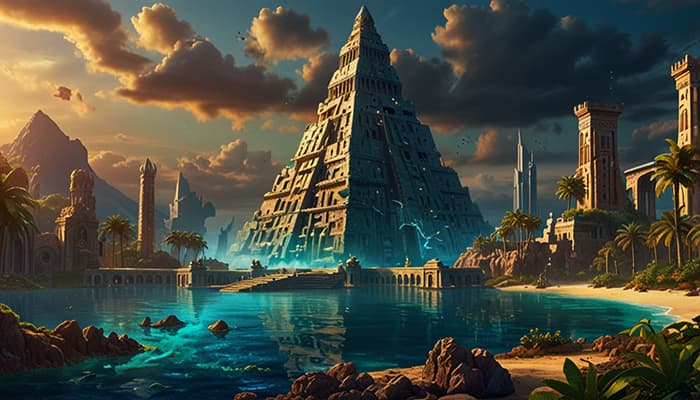The Legend of Atlantis: Unveiling the Ancient Mystery

The Legend of Atlantis: Unveiling the Ancient Mystery
For thousands of years, the tale of a lost, sunken city has fascinated the imaginations of countless people across the world. Could Atlantis, the legendary civilization spoken of by the ancient philosopher Plato, exist? Or is it just a myth? Let’s dive deep into the mysteries surrounding this fabled city and explore the truth behind The Legend of Atlantis.
- The legend of Atlantis begins with the philosopher Plato. In his dialogues Timaeus and Critias, written around 360 BCE, he described a powerful and advanced civilization on a vast island beyond the “Pillars of Hercules,” today known as the Strait of Gibraltar.
- Plato described Atlantis as a technologically advanced utopia, home to a highly sophisticated society. Its people were said to have conquered much of Western Europe and Africa. But, in one cataclysmic event, the island vanished beneath the ocean in a single day and night of misfortune.
- But was Plato recounting real history, or was this a parable—meant to convey a deeper philosophical lesson about hubris and the dangers of human greed?
Over the centuries, countless explorers and scholars have tried to locate the sunken city of Atlantis. Many have pointed to possible sites where remnants of this lost civilization might lie, from the Mediterranean Sea to the Caribbean.
Popular Atlantis Theories
One of the most popular theories is that Atlantis was inspired by the Minoan civilization, which thrived on the island of Crete and nearby Santorini. The eruption of a massive volcano on Santorini in 1600 BCE may have caused widespread destruction, leading to myths of a lost city swallowed by the sea.
Other theories stretch further afield. The underwater Bimini Road in the Bahamas is often cited as evidence of a long-lost civilization. At the same time, some more speculative ideas even suggest that Atlantis could be hidden beneath the ice of Antarctica.
So, what was Atlantis like according to Plato’s accounts? He wrote of a vast island empire divided into concentric rings of land and water. At the center was a magnificent palace and temples dedicated to Poseidon, the god of the sea.
The Atlanteans were said to be skilled engineers, able to control their environment through advanced technologies. Their civilization was rich in resources, boasting metals like gold and silver. But despite their power and prosperity, the Atlanteans were not without flaws.
According to Plato, it was the greed and moral decay of Atlantis that led to their downfall. As they grew more ambitious, they sought to dominate the known world. But their actions angered the gods, who punished them by sending earthquakes and floods, sinking their city into the ocean.
Despite centuries of speculation, no concrete evidence of Atlantis has been discovered. Many historians believe the story is purely allegorical—a cautionary tale about the dangers of hubris and overreach.
Yet, others remain convinced that Atlantis may have a basis in historical events, pointing to similarities between the Minoan civilization’s destruction and Plato’s account. Could it be that Atlantis is not a literal place, but a composite of various ancient disasters, natural and manmade?
While mainstream science may dismiss the idea of a literal sunken city, the allure of Atlantis endures. Discoveries in marine archaeology and satellite imaging continue to spark interest, keeping the legend alive.
Whether Atlantis was a real place or just a story, it has captured the human imagination like few other myths. It speaks to our desire to explore the unknown, to uncover hidden truths, and to believe in something larger than ourselves—a lost world waiting to be rediscovered.
Perhaps one day we will uncover the secrets of Atlantis, or perhaps its true meaning lies in the lessons it has taught us through the ages. Until then, the legend of Atlantis remains one of the greatest mysteries of all time.